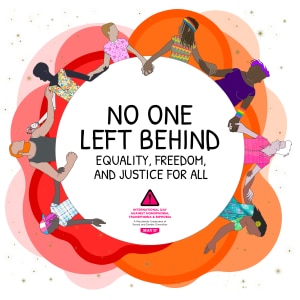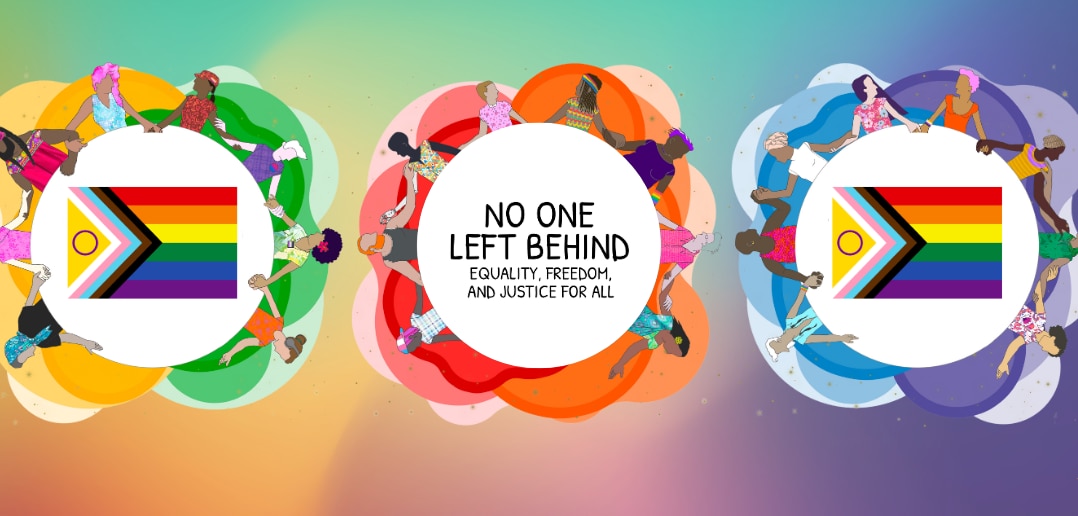International Day Against Homophobia, Transphobia & Biphobia (IDAHOBIT), is celebrated each year on 17 May and aims to raise awareness about the discrimination, violence and challenges faced by the LGBTQIA+ community.
The Universal Declaration of Human Rights just marked its 75th anniversary in December 2023. Whilst it’s not just international law, it also helps to navigate a diverse world by distinguishing a set of values that everyone can live by and create a sense of global harmony. However, whilst we acknowledge that ‘all human beings are born free and equal in dignity and rights’, this is yet to be fulfilled for many LGBTQIA+ people around the world. And for anyone suffering layers of inequalities on their lives.

This is why the day is acknowledged – there is still work to be done, and where this year’s theme has arisen; ‘No one left behind: equality, freedom and justice for all’ – a call for unity; only through solidarity for each other will we create a world without injustice, where no one is left behind.
As an active member of both our Spectrum and REACH employee-led networks, when I think about this theme, I’m reminded that the challenges faced by the LGBTQIA+ community aren’t just isolated to members of a particular sexual orientation, and that similar acts of behaviour appeared when we explored the subject of subtle acts of exclusion or microaggressions. Catch up on this short article to find out more.
Examples of microaggressions
As a typical example, when I say I was born and raised in Hertfordshire, I often get asked “but where are you really from?” and it comes with what I like to call the ‘tilt and squint’. You know, when someone tilts their head slightly to the side and squints their eyes with disbelief while they ask the same question again as if they were examining an artefact in a museum.
They couldn’t possibly accept your first answer as the truth, and you must be lying because it doesn’t fit the stereotypical label they have assigned in their mind. Or that you must be confused and didn’t understand the question at hand so they feel they must ask again, but this time they slow down their speech as if you didn’t understand the words that were coming out of their mouth and that English must be a foreign language and difficult to understand. Ridiculous, right? So is the question! I exaggerate this with jest, but the truth is I couldn’t tell you the number of times I’ve been asked that question and the negative way it makes me feel – especially from people I don’t know.
There is clear evidence to support the idea that acts of aggression sadly still occur. Some at a micro level and some more obvious perhaps. You might even think of an example that was inflicted on you, or maybe you said or did something, quite innocently without intention, which in hindsight could be considered as an act of microaggression.
It’s clear that acts of aggression affect us all – whether we’re the recipient or the instigator. I encourage you to think and look beyond the parameters of sexual orientation as suggested at the top of this article, but also consider other characteristics such as age, gender, race, belief, disability, marriage, pregnancy etc.
Intersectionality
I write this article to raise awareness of our behaviours and our voice; the phrases we say out of habit without realising their meaning or where they come from, the things said in jest which could result in being quite harmful, the actions we’ve learnt from observation because ‘that’s how it’s always been done’, or the decisions we make because of an unconscious bias. These are not unique to a specific characteristic but do affect us all. Therefore, it would be unfair to write this on behalf of Spectrum alone but include the perspective from all our employee-led networks; REACH, Athena and m’power, to members and to allies.
I write this article on behalf of anyone who has experienced an act of aggression of any kind – not limited to any protected characteristic as such, other than the one we all share, that we’re all human. We all deserve dignity, respect, care, and support. And so, for this year’s IDAHOBIT, I propose we acknowledge and practice that no one is left behind, and we strive for equality, freedom, and justice for all. And what’s even better is that you don’t have to look any further than our very own Culture Essentials that describe some of the best practice you can adopt if you’re thinking about how you might adjust your thinking and behaviour.
Things you can do
- Get involved with our employee-led networks – find out more here.
.- Educate yourself and take the time to learn about the issues facing the LGBTQIA+ community and understand the significance of the International Day Against Homophobia, Transphobia, and Biphobia. Find out more here.
.- Show your support and be an ally. This could mean speaking out against discrimination, providing a safe and inclusive space, or simply listening to and supporting your colleagues.
.- Consider donating to charities and organisations that support and promote equal rights. These initiatives and services support the well-being of those who are experiencing hardship.
.

